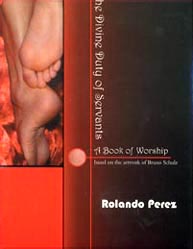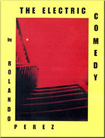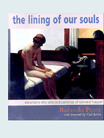
Also by
Rolando Perez
The Electric Comedy
The lining of
our souls
Anarchy and
Schizoanalysis
Publisher: Autonomedia
The Street of
Crocodiles
Author
Bruno Schulz
Pub: Penguin Classic
 |
THE DIVINE DUTY OF SERVANTS:
A book of Worship Rolando Perez ISBN HC: 1-887276-17-3 US: $ 22.95, Can: $ 26.95 ISBN Paper: 1-887276-16-5 US: $ 12.95, Can: $ 16.95
|
|
|
"Novelist and playwright Perez reimagines fairy tale princesses like Snow White and Cinderella as dominatrices enjoying the favors of their worshipper...while other...sketches aim to delineate the erotic visions and political theories of the Marquis de Sade, Wilhelm Reich, Marx and Freud." - Publishers Weekly December 20, 1999
A must for those intrigued by the polarities inherent in erotic literature. Like The Story of O, Venus in Furs, and the writings of Sade, The Divine Duty of Servants weaves with humor and irony a tale inclusive of such opposites as clean/unclean; good/evil; beauty/ugliness; freedom/bondage to introduce the brilliant, creative output of the complex Jewish writer and artist, Bruno Schulz (1892-1942).
The Divine Duty of Servants is a unique work that unites prose and art, to explore the dark mythologies of sexual fetishes and power. If it is true, as the French writer Georges Bataille claims, that eroticism and religion go together, then this book sheds light on the eroticism of worship.The Divine Duty of Servants introduces the work of "outsider" Malcolm McKesson - a writer and an artist who like Bruno Schulz, dealt with such topics as foot fetishism, cross-dressing, and erotic scenes of bondage and submission. First Experience Every fetishist remembers the exact time of day, the minute, the second, the object of his obsession became conscious. The way the sun cast shadows on the wall, or not; the sound outside his room, or the absence of sound; the shape of a cloud that moved overhead at that particular point in time, or a cloudless and clear sky; and all the “insignificant” little things that everyone else on that day, at that hour, quite normally failed to notice. But, there are memories one simply cannot live without; memories we take to our graves. They are precious to us, either because they remind us of a golden moment in a past we can never recapture, or because they marked the beginning of something important in our lives. Swann was transported to his childhood with the mere dipping of a biscuit in tea. And the memory of his childhood governess shot dead through a window—the image of her body lying lifeless on the floor: her skirt pushed up above her thighs, to reveal her legs in black stockings, marks the beginning of Archibaldo de la Cruz’s obsession with mannequins and his death-sexuality fetish. Few artists have understood the psychology of the fetishist as well as Buñuel. His Archibaldo, like Proust’s Swann, is a character haunted by the past. His fetish, the product of a certain moment in his own personal history. To be a fetishist is to be obsessed with time. Both the fetishist and the hysteric share this obsession. But while the hysteric runs away from time, the fetishist runs towards it and embraces the time “when…”, and tries to re-live it with every “repetition” of it. In my own story, as I’m sure, in the stories of others like myself, it all happened very suddenly: one afternoon while W— and I played together. For though I was already taken in by the beauty of her hair, her lips, her eyes, her girlishly rosy cheeks, never until then, had I given her feet even a passing glance—those delicate little feet of hers. But then, what normal 13 year old would look at a girl’s feet with lust? Yet I had. Maybe it was because she had brushed my leg with the sole of her foot. Perhaps. It was a bit like discovering a door I had always passed through, for the first time. I couldn’t believe that this was happening to me, and yet my new experience filled me with all kinds of strange, and inexplicable desires. W—’s feet were white, milky smooth. They were the feet of those angelic nymphs in Pre-Raphaelite paintings of the 19th century. And I wanted nothing more at that moment than to take her feet in my hands and kiss them. Her toes, so pretty, so delicate, the soles of her feet had the appearance of white velvet, such that whenever I come across a reproduction of Ingres’ Grande Odalisque, I always think of those exquisite feet that so long ago opened up a world for me. For without her realizing it, she changed my life, that quiet, peaceful, summer afternoon in my parent's house; that afternoon when we played together on the floor, and she was barefoot. It was she and she alone that brought religion to my life. Without her I would, no doubt, have remained—even at that young age—a mere atheist, lacking in spirit, deprived like so many others in our century of a worthy object of worship; ignorant, even of that most spiritual of all books, Mr. Schulz’s Booke of Idolatry Cuban born, Rolando Perez, is the author of numerous books on a variety of subjects ranging from philosophy and literary criticism to poetry and drama. Some of his published titles include On An(Archy) and Schizoanalysis, Severo Sarduy and the Religion of the Text, The Lining of Our Souls (based on selected paintings of Edward Hopper. Cool Grove) and The Electric Comedy (Cool Grove). He has also written over 15 plays that have received production in NYC. Mr. Perez has a B.A. in philosophy from Trenton State College, an M.A. in philosophy, an M.A. in Spanish (both from Stony Brook), and a Masters in Library Science from Rutgers University. He is a librarian and the Spanish/French bibliographer at Hunter College. |
||




